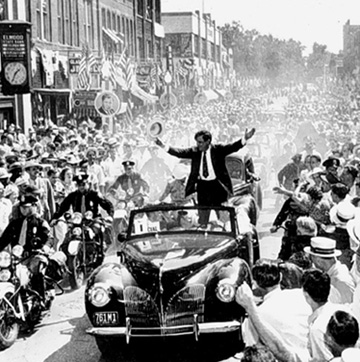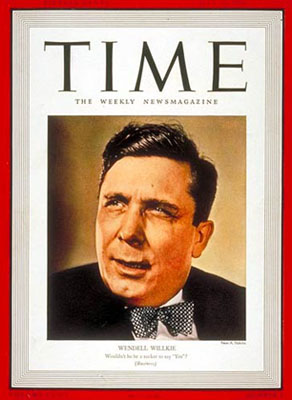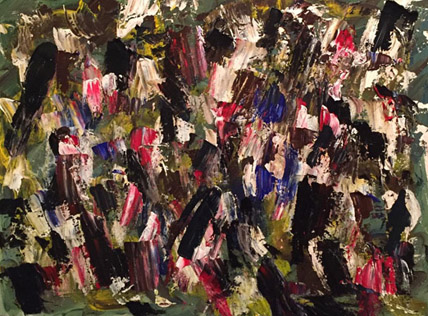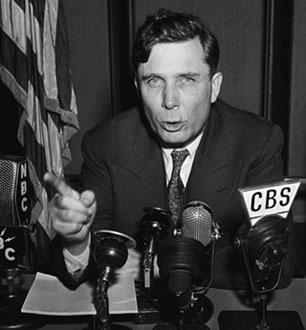Is there a Republican Party leader at all like Wendell Willkie somewhere in the USA today?
Feb 22nd, 2022 | By Citizen X | Category: USA TodaySPECIAL FROM THE DEMOCRATIC DESKTOP OF CITIZEN X, BUCKHORN, ON. K0L 0C1. 22 FEB 2022. In the midst of all the snow this year — and TV news about the so-called Freedom Convoy 2022 and other current crazy-town antics in Canadian government and politics (and yes also American, and much beyond) — I have taken to reading Jill Lepore’s excellent 2018 book These Truths: A History of the United States, in my spare moments.
As no less an authority than Bill Gates has reported on the goodreads website, this book is “packed with amazing details I had never read before.” My own latest discovery is Wendell Willkie, the “simple, barefoot Wall Street lawyer” who ran for the Republicans against the Democrat Franklin Delano Roosevelt in the US presidential election of 1940.
I suppose I might already have vaguely known that Wendell Willkie was an unsuccessful US presidential candidate a few years before my birth. But I remembered him most clearly from the lyrics of a Cole Porter tune. After some present-day struggle it finally came to me that the tune was “Farming,” from the 1941 Broadway musical Let’s Face It. (As in : “They tell me cows who are feeling milky / All give cream when they’re milked by Willkie, / Farming is so charming they all say.”)
Now, however, towards the end of February 2022 a few of Jill Lepore’s particular sentences about Wendell Willkie, the “dark horse” US politician and public figure of the first half of the 1940s, have particularly struck me. And they have opened my eyes to his high-minded kind of American democratic and Republican politics (something that seems so lacking in the USA today).
The Six Points
I think I can more or less summarize my personal Wendell Willkie discovery with six short quotations from Jill Lepore’s These Truths : A History of the United States. They begin with the US presidential campaign of 1940. The Second World War had started to rage in Europe, but the USA remained, for the moment, nominally neutral :
(1) “The president’s short-of-war strategy had led him to propose the first ever peacetime draft ; Willkie refused to oppose it. ‘If you want to win the election you will come out against the proposed draft,’ a reporter told Willkie. Willkie answered, ‘I would rather not win the election than do that.’” (p 478)
(2) “As he readied for his third inauguration, Roosevelt took time to write a note to Churchill, which he trusted to his defeated opponent, Wendell Willkie, to deliver in person. ‘He is truly helping to keep politics out over here,’ Roosevelt said of Willkie.” (p 480)
(3) “Willkie, after meeting with Churchill, flew back to Washington … When isolationists … presented him with remarks he had made during the campaign, about Roosevelt rushing the United States into war, Willkie waved those remarks aside as campaign bluster. ‘He was elected President,’ Willkie said. ‘He is my President now.’” (p 481)

(4) After the surprise Japanese attack on Pearl Harbor, on December 7, 1941 (followed by Hitler’s declaration of war on the United States on December 11 — conveniently enough, Ms Lepore argues, “since it’s by no means clear that Roosevelt would have been able to convince Congress to declare war on Germany”), Roosevelt and Churchill began discussing the concept of a United Nations, to help keep the peace after the end of the Second World War. And (in Jill Lepore’s words again) “Wendell Willkie dedicated himself to the work of convincing the Republican Party to abandon isolationism once and for all.” (Pp 485, 492)
(5) In the summer of 1942 “Roosevelt asked Willkie to undertake a world tour to publicize the idea of a United Nations. He left in August, flying on a bomber named the Gulliver. Forty-nine days of travel included stops in Russia, the Middle East, and China. In a radio address that he gave when he got back, he called for an end to Western imperialism and the beginning of a new arrangement among nations.” (p 492)
(6) One World, the book Wendell Willkie “wrote about his trip and his vision, headed every best-seller list in the country, becoming only the third book published in the United States to sell more than a million copies. Roosevelt called for a United Nations, but it was Willkie who raised public support for it.” (p 492)
Further Wendell Willkie bio etc
Inspired by these pages from Ms Lepore’s history book, I went on to explore the Wendell Willkie saga somewhat further via two (I think) good and certainly instructive Wikipedia articles : on Wendell Willkie himself, and then on “1940 United States presidential election.”
Very quickly, Willkie was born in 1892 and raised in Elwood, Indiana. His parents were both lawyers (and his maternal grandparents had manned barricades in the German variations on the failed European revolutions of 1848). He graduated from Indiana University with a law degree himself, and went on to work with a legal firm in Akron, Ohio. His Ohio work on electric utilities law attracted the attention of the New York-based utility holding company Commonwealth & Southern Corporation. In 1929 Wendell Willkie moved to New York as counsel to Commonwealth & Southern. In 1933 he became president of the corporation. And the rest, as they say, is political history.
I am of course far from the first person to imagine that the political (and economic) history of Wendell Willkie in the 1940s might have something to say about the dilemmas of Democracy in America in the 2020s.
As just three of more than a few cases in point, note : David Levering Lewis’s 2018 book, The Improbable Wendell Willkie: The Businessman Who Saved the Republican Party and His Country, and Conceived a New World Order ; Wendell L. Willkie II’s October 6, 2018 Atlantic article, “My Grandfather Was a Republican Nominee Who Put Country First … Wendell Willkie has been compared to Donald Trump, but he powerfully articulated liberal ideals of political and economic freedom” ; and “A Farewell to Arms,” Michael Falcone’s 21 October 2020 New Rambler “Review of The Idealist: Wendell Willkie’s Wartime Quest to Build One World, by Samuel Zipp, Cambridge, MA: Harvard University Press, 2020.”
Conclusions
My own very hasty final thought is that the political career of Wendell Willkie may finally not be that good an example for today’s Republican Party USA, USA.
For most of his life he was a somewhat right-wing Democrat, who became a somewhat left-wing Republican when it became clear that Franklin Delano Roosevelt would run as a Democrat for an unusual third term. Until close to the end Willkie was a “dark horse” in the race for the 1940 Republican presidential nomination — at a very unusual party convention, with the war in Europe already underway …
And then alas, the dark horse seems to have over-indulged in companionable alcoholic drinks, and otherwise neglected his health. He died in New York City after multiple heart attacks on October 6, 1944, at the all too early age of 52.
Wendell Willkie still suddenly strikes me as a “new” (to me at least) and unusually interesting figure from American political history — who may yet have some benign broader relevance for politics in the USA (and Canada and New Zealand and other homes of “Trucker” Convoys … who just need to hear One World from “Back Home Again In Indiana” … and the “simple barefoot Wall Street lawyer” … etc). As Jesse Jackson used to say in the 1980s, “Keep Hope Alive” ????







